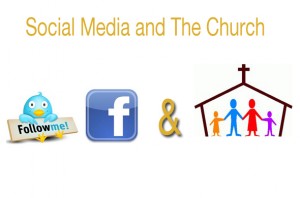(ThyBlackMan.com) “Digital technologies are changing and evolving constantly,” Bourgeois, “Ministry in the Digital Age”
I hope you’re helped by this blog that shows the uniqueness and power of applying the Internet and Social Media tools to build the kingdom of God. The Church of Christ theme:
Saving Souls and Keeping Souls Saved is a commission and a pledge throughout the world.
The Church of Christ A.D. 33, “Upon this rock I will build my Church……..,” Jesus Matthew 16:13-20 King James Version (KJV)
These words where stated when the thought of an Internet or Social Media was not even formed yet in the minds of men, God knew one day that man would develop a tool or a platform that would encompass that world, allow for access to information never thought to be possible. The Internet and Social Media is a tool that can lead people to the gospel and ultimately lead people to baptism and their souls saved.
The Gutenberg Press opened doors to new opportunities of learning, since the majority of the people at that time did not know how to read unless you were royalty, an aristocrat or were wealthy. The benefits of reading and intellectualism began to spread. It was important to be able to read and to discuss local and even world events being published in newspapers that covered diverse events.
Today reading and comprehension are vital to the very survival of people. As Malcolm X stated, “You can’t go anywhere without an education.”
To this day the most printed and published documents in the world is the bible and its diverse languages, interpretations and formats. Designed to touch the lives of all people from toddlers to seniors.
The power of education and the integration of technology has a transformative change on all citizens of this world. Needless to say Social Media is here to stay and the platforms are growing. The platforms of Facebook, Twitter, Blab, Vine, LinkedIn, Periscope,  Snapchat, Youtube, Podcasting and other forms of social media continue to transform communication on a global scale.
Snapchat, Youtube, Podcasting and other forms of social media continue to transform communication on a global scale.
Research by the Pew Research Institute has shown (2014) 71% of online adults use Facebook, 23% use Twitter, 26% use Instagram, and 28% use Pinterest. Teens and young adults prefer Facebook (71%), Instagram (52%), Snapchat (41%), Twitter (33%), G+ (33%) and Vine (24%). The numbers fluxuate as the building of features are added to allow for increased functionality.
Blogging has grown in prestige, in 2014 an estimated 6.7 million people blog worldwide, and an estimated 2 to 3 times more read those blogs. Political and religious debates are held through Facebook, Twitter and in Podcasts, the passion of these discussions can be seen through the choice of words, phrases and even emoticons.
Combined with Hashtags millions more can be reached and even influenced in thinking and actions. Polls are taken online, people can submit questions online so the observer becomes a participant guiding discussions.
Unfortunately Ministers and Evangelists of the Church of Christ are still struggling with the application of Social Media platforms in their preaching and teaching. Here are some guides to understanding why the Church of Christ should have a Social Media presence no matter
how small or large, the benefits are tremendous in reaching those that do not understand the gospel and are lost in teachings that are not spiritually lead and in danger of leading people to damnation, not salvation.
The Ministers, Evangelists, Elders, Deacons and others in leadership must understand why they need to have a Social Media presence. Not just a web site to throw information on it, but an interactive and multimedia (if possible) presence on the web to attract people, build a relationship and draw people in to teach them scripture, how to apply scripture to real life and build a foundation on to become baptized.
Suggestions to applying Social Media for Ministers and Church Leadership
1. Not being on social media can create missed
opportunities to share the gospel.
A minister not on social media is just as handicapped as a minister not using a smartphone, computer, or tablet. Ministers now are using these to read scriptures, build content for their preaching and apply scriptures to real life. The power of Social Media allows ministers to have their own Podcasts, Web TV stations and radio stations for free. Ministers cannot afford not implementing technology because the younger members of the Body are using it every
day and not for spiritual growth. Ministers must be able to provide content each day to keep salvation on the minds of their members because the world will try to distract and trap
them in sin.
2 . Not being consistent.
If ministers are going to participate in Social Media, they must be a consistent presence to share information. Ministers do not have to be on every platform, but select one or two that the majority of their members frequently access and use. This builds a consistent platform that can become effective in sharing the gospel, uplifting people and drawing in new members. Consistency is a big factor when building an online relationship. If a minister cannot login to Facebook every day or tweet several times a day or share Instagram photos or video during the week they either need to hire a Social Media consultant or not bother at all. The results could be losing members that see the benefits but the church does not.
Engagement – Engagement – Engagement is important.
3. Ministry is personal, but not personal
The leadership and ministers should understand that Ministry is personal, it is a personal responsibility to God, but ministers must have a personal responsibility with their flocks being lead by the word. There can never be personal attacks on character, finances, relationships in the church with church members. The platform is not for gossip and innuendo.
If members begin to see inappropriate postings they will gradually move away from the Social Media content and even the church. Social Media becomes sacred just like the grounds of the church so the content must be spiritually lead, gospel laced, and uplifting of truth. It is not for just a ministers or the leadership personal dating service or sharing gossip.
4. Not All Ministers are funny
Humor has a way of breaking the ice between people, not all ministers have the ability to create laugher when preaching and teaching, so ministers must keep their cool and their personas’.
If possible a joke, a funny story or personal event can work, but if it comes out of character it may not work. The other issue is cultural remarks, religious implications and gossip cannot be used. Personal stories that show the “human” side of ministry help to provide a “connect” with members because ministers are human also.
5. Assuming social media is inherently bad.
Social Media is a tool, it should not be used in overabundance causing problems in relationships, or blamed for problems attributed to divorce, adultery, or other societal situations.
When applied correctly Social Media can be very helpful and contribute to strengthening a community that has similar interests and passions.
Facebook cannot cause marital affairs that is a choice two people make when meetings, Instagram cannot cause a lusting of the flesh, that is a personal decision engaged in, downloading and sharing pornography is a choice. The church can provide resources that deter these events, but the people make the choice to engage in actions.
Ministers can speak that SM can be used positively or negatively through exposure, there is no inherent morality. Ministers should focus that Social Media as a useful for the building of the Kingdom not for personal fame or gain.
Staff Writer; William D. Jackson
Find out more about this talented writer over at; OCS For Education.

















Leave a Reply